|

Morning Stars Shine on GW’s Commencement | GW Welcomes New Vice Presidents| To Your Health…and Wellness! | An Evening With Dave Brubeck… | GW Lures Promising Quartet for Three-Year Residency | GW’s 2001 Frosh Crop: An “Embarrassment of Riches” | GW Radio All Jazzed Up | Hobbs Named Men's Coach | GW Awards Israeli President Honorary Doctorate | GW Launches Paris, Brasilia Study Centers | | Kormis Is New Executive Director of University Relations | Changing U.S. Health Care Climate Writes Final Chapter for GWUHP | GW Establishes New College and For-Profit Venture | Students Win NASA Design Competition | Student Living Reaches New Heights | So, Mr. President….How did you spend your summer vacation? | At a Glance

Morning Stars Shine on GW’s Commencement
 |
|
Leonard Slatkin, Rita Colwell, and Tony Bennett await the opening procession.
|
An impressive slate of American icons and accomplished professionals graced the podium at GW’s commencement May 20, inspiring the 4,000 graduates of the class of 2001 with their words of wisdom. The majestic Ellipse, the historic park located between the White House and the Washington Monument, once again provided a magical setting for the joyous celebration.
Pulitzer Prize-winning author Herman Wouk captivated the 20,000-strong crowd with his keynote address. The master storyteller, who wrote such classics as The Winds of War, War and Remembrance, and The Caine Mutiny, delighted the audience with his rendition of a fable about a mother mouse who barked like a dog to scare away a cat. After the cat fled for his life, the mother mouse turned to her children and exclaimed, “Now, my dears, you see the advantage of having a second language.”
Wouk went on to discuss what he calls the two languages of life: the language of the moment, and the language of origins, family, and tradition. “I urge you to hang onto that second language, because you will find in the great moments of your lives—the birth of a child, the falling in love, the confronting of a catastrophe—the language of the moment falls silent…The language of your origins is…the most rewarding in the long run, the language to which you will turn.”
Wouk received an honorary degree at the ceremony, along with American pop music legend Tony Bennett and five other honorees. Bennett, who has won nine Grammy Awards and sold some 50 million albums during his 50-year professional singing career, advised graduates to maintain their integrity throughout their lives. Later in the ceremony, he responded to the crowd’s persistent chant of “sing, sing, sing,” by crooning the final line of his hit song, “I Left My Heart in San Francisco.” The delighted audience exploded with applause.
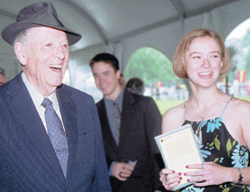 |
|
Herman Wouk and student speaker Larissa Davis share tips on addressing large crowds.
|
Also receiving honorary degrees at the ceremony were Rita Colwell, director of the National Science Foundation; Charlene Drew Jarvis, president of Southeastern University and former D.C. City Council member; H.R. Shepherd, inventor of the asthma inhaler; Leonard Slatkin, music director of the National Symphony Orchestra; and John R. Tydings, president of the Greater Washington Board of Trade. Upon receiving their degrees, each honoree delivered brief remarks to the graduates.
Other highlights of the day included an address by graduating senior Larissa Davis and the presentation of the Oscar and Shoshana Trachtenberg Prizes to three outstanding faculty members: Peter Rollberg, associate professor of Slavic languages (for teaching), David Reiss, professor of psychiatry and behavioral science, of medicine, and of psychology (for research), and Linda Lou Gallo, MS ’63, PhD ’69, professor of biochemistry and molecular biology (for service).
Sandy Holland, executive editor of GW Magazine, was one of eight members of the University community who received the “GW Award” in recognition of outstanding contributions to the University. Also honored with GW Awards were Craig Linebaugh, associate vice president for academic planning and special projects, Dennis Holmes, professor and former chair of the Department of Educational Leadership, Clyde Lee Davis IV, lead developer for Prometheus, GW’s course management system, Thelma Spriggs, general service manager, graduating medical student Susan Fisher-Owens, and graduating seniors Jeff Marootian and Catherine Resler.
—Jamie L. Freedman

GW Welcomes New Vice Presidents
The University recently announced the appointment of two new vice presidents in key areas of GW activity. Beverly K. Bond is the new vice president for advancement and Richard N. Sawaya the vice president for government, international, and corporate affairs. Bond succeeds Michael J. Worth, who stepped down in August as vice president for development—a post he had held since 1983. Worth now has moved to the department of public administration, where he is professor of nonprofit management.
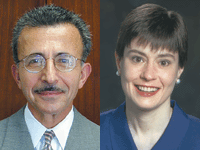 |
|
Richard N. Sawaya and Beverly K. Bond
|
Bond comes to GW from Vanderbilt University, where she served as vice chancellor for alumni and development, with responsibility for development and alumni relations and publications for Vanderbilt’s 10 schools, the medical center and hospital. A graduate of the University of Michigan and Vanderbilt’s Owen Graduate School of Management, Bond led Vanderbilt’s successful Campaign for Vanderbilt, which produced $560 million for the Nashville institution.
Sawaya most recently served GW as a special consultant to the University, managing federal relations. A native of Los Angeles, Sawaya has represented companies such as Atlantic Richfield Company and Chevron. He is a graduate of Boston College, with a doctorate earned at Harvard as a Wilson and Danforth Fellow. At GW, Sawaya is leading the long-range planning effort for the University’s governmental, international, and corporate affairs. He is also advising GW and its Board on governmental, international, and corporate affairs issues.

To Your Health…and Wellness!
 The crowds around the northwest corner of 23rd and G Streets these days are attributable to the newly opened GW Health and Wellness Center. The 188,000-square-foot, state-of-the-art facility hosts a wide variety of fitness and instructional classes, walk-in recreation, sport club, and intramural and wellness programs and services. All current employees and students are eligible to join the center, which features such activities as racquetball, basketball, volleyball, badminton, and squash. A three-lane suspended jogging track, a three-lane indoor 25-yard lap pool, and a 9,800-square-foot cardiovascular and strength training center also highlight the Center’s diverse offerings. More information about GW’s new center is available at http://gwired.gwu.edu/gwellness. The crowds around the northwest corner of 23rd and G Streets these days are attributable to the newly opened GW Health and Wellness Center. The 188,000-square-foot, state-of-the-art facility hosts a wide variety of fitness and instructional classes, walk-in recreation, sport club, and intramural and wellness programs and services. All current employees and students are eligible to join the center, which features such activities as racquetball, basketball, volleyball, badminton, and squash. A three-lane suspended jogging track, a three-lane indoor 25-yard lap pool, and a 9,800-square-foot cardiovascular and strength training center also highlight the Center’s diverse offerings. More information about GW’s new center is available at http://gwired.gwu.edu/gwellness.
|

An Evening With Dave Brubeck…
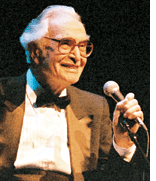 …is priceless—a jewel for the memory box. The Grammy Lifetime Achievement Award winner makes melodious, magnificently constructed music and makes it seem effortless. With inspired help from the rest of the quartet—Randy Jones on drums, Michael Moore on bass, Bobby Militello on sax and flute—Brubeck offered the large and vocal audience at “President’s Night 2001” old favorites and selections from his latest, not-yet-released CD. In the course of the evening three GW students—Adam Kleiner, Steve Kaplan, and Steve Rogers—joined in on “Take the A Train”; and during intermission President Trachtenberg presented a GW President’s Medal to Brubeck. But in the end, there was one star at GW Oct. 18, and that star was jazz icon Dave Brubeck. …is priceless—a jewel for the memory box. The Grammy Lifetime Achievement Award winner makes melodious, magnificently constructed music and makes it seem effortless. With inspired help from the rest of the quartet—Randy Jones on drums, Michael Moore on bass, Bobby Militello on sax and flute—Brubeck offered the large and vocal audience at “President’s Night 2001” old favorites and selections from his latest, not-yet-released CD. In the course of the evening three GW students—Adam Kleiner, Steve Kaplan, and Steve Rogers—joined in on “Take the A Train”; and during intermission President Trachtenberg presented a GW President’s Medal to Brubeck. But in the end, there was one star at GW Oct. 18, and that star was jazz icon Dave Brubeck.

GW Lures Promising Quartet for Three-Year Residency
If “serendipity” is truly the art of finding valuable or agreeable things not sought, then it is an art GW seems to have mastered—with the Coolidge Quartet and the GW community being the ultimate beneficiaries.
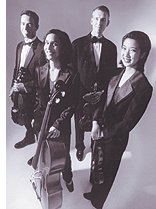 The story began in 1997, when four talented musicians from different parts of the world met, clicked musically, and ultimately became the “Coolidge Quartet.” They were in Hartford, Conn., where the renowned Emerson Quartet was in residence at the Hartt School of Music—the conservatory of the University of Hartford and one of the highest rated music schools in the country. For the next year the new Coolidge Quartet stayed in Hartford and received solid, creative mentoring by the Emerson players. The story began in 1997, when four talented musicians from different parts of the world met, clicked musically, and ultimately became the “Coolidge Quartet.” They were in Hartford, Conn., where the renowned Emerson Quartet was in residence at the Hartt School of Music—the conservatory of the University of Hartford and one of the highest rated music schools in the country. For the next year the new Coolidge Quartet stayed in Hartford and received solid, creative mentoring by the Emerson players.
Fast-forward three years—which the Coolidge Quartet spent just a few miles away, fulfilling a three-year fellowship with the revered Guarneri String Quartet at the University of Maryland. Now, though, their fellowship over, the Quartet was looking for a new home base. They sent out a demo CD and a letter. One of the GW recipients was Roy Guenther, chair of the Music Department. Another was President Stephen Joel Trachtenberg—who just happened to have been president of the University of Hartford in the 1980s when the Emerson Quartet began its residence there! Bingo!
“The fact that this young quartet had its start under the tutelage of the Emerson Quartet must have truly leapt off the page at President Trachtenberg,” says Guenther with a delighted laugh. “It is certainly a fact that also impressed me. First the Emerson, then the Guarneri…this quartet had wonderful mentoring.” The wheels were put into motion, negotiations were concluded, and when the dust had settled GW had an agreement for a quartet in residence for the next three years!
“This is a delightful group of young talent whose musical destination may well be someplace very special,” says Trachtenberg. The foursome—Amy Leung, cello, Hasse Borup and Se-Yun Lee, violins, and Paul Reynolds, viola—already have found intriguing destinations with their music. The Quartet has performed in Europe, Israel, Hong Kong, Australia, Guatemala, and at festivals such as the Aspen Music Festival; it has won prizes at both the Fischoff National Chamber Music Competition and the Chamber Music Yellow Springs Competition.
The GW residency will include lunchtime and evening concerts, the conducting of master classes, educational offerings to local schools, and Foggy Bottom concerts in the neighborhood. What does the group play? “Virtually everything,” says Guenther. “They play the standard repertoire—Haydn, Mozart, Beethoven, Brahms, also 20th century composers such as Shostakovich and Britten. They also are very interested in new music; in fact, one aspect of their mission here is to try to encourage composers to write for string quartet and audiences to listen to their music,” Guenther notes. He also points out that, while it is not unique for a group to have this latter interest, “it is a bit risky for a new group to take that attitude.” The quartet’s first CD contains mainly “new music,” but their concerts will have some of each.
Guenther is enthusiastic about the sound the Coolidge Quartet produces—and he makes very clear that the sound is no accident. “They go at it with such care,” he says. “First they analyze and tear each piece apart, then maybe two of them play, then three… They say they don’t believe a string quartet must always ‘blend’; they are very careful to see where the composer wanted some voice to stand out. They look at the music to be sure they know how the composer wanted the piece balanced. And what you get,” Guenther concludes, “is a tremendous amount of elegance and clarity.”
—Sandy Holland
For concert ticket information about the Coolidge Quartet appearances at GW, call (202) 994-7129.

GW’s 2001 Frosh Crop: An “Embarrassment of Riches”
The avid competition universities engage in to lure the best and the brightest to their campuses took an unexpectedly positive turn this fall when many institutions—including GW—welcomed their largest classes in history. GW’s class of 2005, some 2,550 strong, is 25 percent larger than last year. The so-called “baby boom echo,” reflecting the greater numbers of students who were born to boomers and now are coming of age, is credited with creating the increased demand on colleges.
Where to put the extra 300 students presented a challenge for GW, since residence hall space is already at a premium and building a new dorm could not possibly be accomplished in time. GW’s novel solution: a long term (15-year) lease agreement by which GW has taken over an entire hotel—now renamed “City Hall”—and made up the rest of the shortfall by means of leasing space from another local hotel. Both hotels are so close as to be virtually “on campus.” This year, GW is housing approximately 5,400 students in the campus area.
Most University officials believe that the usually reliable formula historically used by admissions officers to determine how many students, of those who are offered admission, will actually come to GW was thrown off this year because of the larger pool of applicants. GW’s yield (those admitted who choose to attend) was expected to be 28 percent but instead rose this year to 33 percent. As a result, Dean of Students Linda Donnels has noted that GW will have to shrink its acceptance rate. “We’ll just get more selective,” she noted. According to Vice President Robert Chernak, that acceptance rate may well drop to 45 percent in 2002.
Among others that faced this year’s housing crunch are Dartmouth College, Bates College, Gonzaga University, and the universities of Arizona, Maryland, Minnesota, and Vermont. Their reported solutions ranged from ones similar to GW’s to converting on-campus study space and asking incoming freshmen to consider deferring their first year for one year.
—SH
|

GW Radio All Jazzed Up
Those Washingtonians with a strong jazz addiction who can’t seem to find a musical fix on their radio dial, never fear;
“GW Presents Capital Jazz” is here.
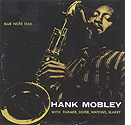 The new radio program, which first aired Sept. 9, is broadcast on WRC-AM 1260; it showcases legendary jazz performances plus music and interviews from the Duke Ellington School of Arts, the John F. Kennedy Center for the Performing Arts, and The George Washington University. The new radio program, which first aired Sept. 9, is broadcast on WRC-AM 1260; it showcases legendary jazz performances plus music and interviews from the Duke Ellington School of Arts, the John F. Kennedy Center for the Performing Arts, and The George Washington University.
Brainchild of Vice President for Communications Michael Freedman, a former general manager of the CBS Radio Network, “Capital Jazz” allows students real-world radio experience while satisfying the thirst of Washington, D.C., jazz lovers. Airing every Sunday from 11 am to noon, the program mixes classic jazz recordings with performances in and around the city.
Freedman initiated the program as a method of cultivating student interest in producing live broadcasts and was able to tap into radio giant Clear Channel Communications’ on-air wealth for the Sunday morning enterprise. “We are always looking for ways to serve the community and GW students.”
Continued Freedman, “We are returning traditional jazz to the broadcast band, which is a win; we invite our burgeoning jazz groups at GW to participate in the broadcasts, which is a win; and it gives our student an entree into the on-air community, another win. So basically, we’re off to a terrific start.”
Hosting the show is Dick Golden, a 30-year radio veteran described by Freedman as “a walking encyclopedia who imparts his knowledge to his audience.”
“We would love to expand the show,” Freedman explains. “Longer broadcast time, greater numbers of listeners—these are all goals of the program. ‘Capital Jazz’ is the only jazz music program on AM radio in Washington, and hopefully,” says Freedman, “with a host as knowledgeable as Dick Golden, listeners will come away from one of these shows as if they’ve just sat through Jazz 101.”
—Zach Kancher

Karl Hobbs: New Coach for a New Era
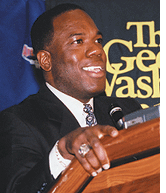 Karl Hobbs sits at his desk in the men’s basketball townhouse on G Street, meticulously trimming family photos, shaping the picture to fit the frame. In many respects, crafting a basketball picture is precisely what the new head coach has begun to do with his squad of men. He’s examining their strengths and strengthening their weaknesses in an effort to present his team in a new frame to the GW community and the college basketball world. Karl Hobbs sits at his desk in the men’s basketball townhouse on G Street, meticulously trimming family photos, shaping the picture to fit the frame. In many respects, crafting a basketball picture is precisely what the new head coach has begun to do with his squad of men. He’s examining their strengths and strengthening their weaknesses in an effort to present his team in a new frame to the GW community and the college basketball world.
“People around here want a good basketball team in the worst way,” Hobbs says. “I’m not saying wins and losses. They truly want a team they can be proud of on the court and proud of what they do off the court, and that’s important to me.”
The 40-year-old coach, husband, and father arrived in Foggy Bottom six months ago. He spent eight years as an assistant coach at Connecticut, where he was part of an NCAA championship team in 1998-99 that posted a 34-2 record.
Right now, Hobbs is still somewhat of a stranger to his players. As the weeks, practices, and games accumulate, Hobbs believes the Colonials, who posted a 14-18 record last season, will gel as a team, though not without their struggles.” It’s going to take some time, but the biggest thing is for them to get to know my personality,” Hobbs says. “I think the other part of it is them understanding the commitment that must be made. That commitment is the level of intensity and that level of hard work.”
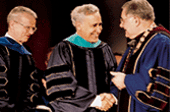
GW Awards Israeli President Honorary Doctorate
Moshe Katsav, president of the State of Israel, received an honorary Doctor of Public Service degree at a convocation held May 30, with Vice President Don Lehman (left) and President Trachtenberg by his side. Conferring the degree, Trachtenberg said, “I am proud to honor President Katsav for his accomplishments and achievements. We pray for peace in the Middle East.” For more than a century, GW has awarded honorary degrees to world figures who have shaped history. Some of these are Egypt’s President Hosni Mubarak, Archbishop Desmond Tutu, Prime Minister Yitzhak Rabin, and U.S. Presidents John F. Kennedy, Harry S Truman, and Ronald Reagan.
|
With a team that lost 59 percent of its scoring from last year, Hobbs knows his team needs to outwork opponents. Next to outworking everyone, Hobbs and his coaching staff of Kevin Broadus, Darrell Brooks, and Steve Pikiell are building a team rooted in defense, rebounding, and completing the fast break.” Those are what I want our goals to be,” Hobbs declares. “The most important thing we have to do at this early stage of the season is establish a work ethic and a commitment to hard work. Once we establish that, then our goal, when we play UConn or Yale, is to simply try and outwork them.”
Junior Chris Monroe will be the one of the primary players on the new look, new picture Colonials. Named to the A-10 Conference Third Team last season, Monroe averaged nearly 19 points and six rebounds a game. Senior Jaason Smith will anchor the inside game, building on his team honor of Most Improved Player last season. Classmate Albert Roma will see playing time as he brings experience to the floor. As the only upperclassmen on the Colonials, these three players need to demonstrate experience to help frame a good team. “The biggest challenge we have this year is trying to overcome our lack of experience,” says Hobbs, whose team won its first game Nov. 15 against Marshall in Lexington, Ky. “When you look at this basketball team and who’s returning, you get scared because there’s only one guy who’s returning who has played regularly.”
Fresh faces are a factor throughout the A-10 conference. Of the 12 teams in the conference, eight new coaches will patrol the sidelines this season. “Because of the uncertainty, I think that’s an opportunity for us to maybe make a jump somewhere,” Hobbs says. “I think it will make the league a little more exciting because when you bring in a new coach, there’s a little bit more excitement, a little more urgency to win.”
Hobbs has the urgency to win. Yet, he knows hard work and discipline on and off the court will create a new picture of GW men’s basketball, as the corners of the past are trimmed away, ready to fit a new frame and a new era.
—Greg Licamele

GW Launches Paris, Brasilia Study Centers
This fall, GW’s Office for Study Abroad and the School of Business and Public Management officially opened the doors of the GW Paris Study Center. The new program, geared toward GW juniors majoring in business, offers courses taught in English by on-site GW faculty and by professors of the center’s partner institution, Institut d’Etudes Politiques de Paris (Sciences Po), one of the premier institutes of higher education in France.
The program kicked off in August with a comprehensive orientation week in the French capital for the 19-student inaugural class. GW business school faculty members William Handorf, professor of finance, Patrick McHugh, assistant professor of management science, and Amy Smith, assistant professor of marketing, constituted the inaugural group of GW professors to teach in Paris.
According to Leonard, the visiting GW faculty members will teach required business courses, such as marketing, human resource management, and international finance, while Sciences Po will offer classes in European business and international communications. Students, who live in apartments in the heart of Paris, will earn 15 GW credits for the semester.
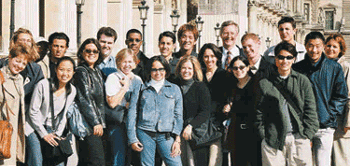 Another integral component of the program is regular meetings with French and American firms conducting business in Paris. So far, the inaugural class has planned corporate site visits to Air France, CNN’s French headquarters, EuroDisney, LUMH Moet Hennessey (the makers of Moet champagne), and Credit Lyonnais. Another integral component of the program is regular meetings with French and American firms conducting business in Paris. So far, the inaugural class has planned corporate site visits to Air France, CNN’s French headquarters, EuroDisney, LUMH Moet Hennessey (the makers of Moet champagne), and Credit Lyonnais.
“We’re very satisfied with the launch of the program,” says Lynn Leonard, director of the Office for Study Abroad. “It’s been a particularly trying semester to inaugurate an international program, given world events, but it’s been truly rewarding to see the GW Paris Study Center welcome its first group of GW students.”
GW is now gearing up to launch a study abroad program at the University of Brasilia, located in Brazil’s capital city, this January. A collaborative effort between GW and the University of Brasilia, the semester-long program was developed by GW’s Center for Latin American Issues, a research center affiliated with The School of Business and Public Management. The program, geared toward Latin American studies majors, will include an intensive language program in Portuguese and four regular three-credit courses focusing on Brazilian and Latin American politics, economics, and society, as well as international relations. Students will live with local families and benefit from the services of an on-site resident director.
—JLF

Kormis Is New Executive Director of University Relations
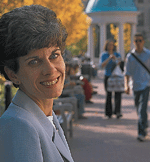 Chris M. Kormis, who for the past several years has produced award-winning publications for the University as director of publications, has been promoted to the position of executive director of University Relations. In this capacity, she will head a 35-person operation that includes media relations, advertising, publications, periodicals (including GW Magazine), graphic design, and community liaison activities. An 11-year GW veteran and holder of BA and MA degrees, Kormis’ accomplishments in such GW publications as the pictorial history, From Strength to Strength, President’s Annual Reports, and The Guide to GW have brought her ongoing praise. According to Vice President for Communications Michael Freedman, to whom Kormis will report, “Chris brings to her new position an abundance of energy, creativity, and enthusiasm, as well as a wealth of knowledge about GW’s history and operations. These, together with her positive, “can do” management style, will help University Relations build on a strong foundation and achieve new levels of success.” Chris M. Kormis, who for the past several years has produced award-winning publications for the University as director of publications, has been promoted to the position of executive director of University Relations. In this capacity, she will head a 35-person operation that includes media relations, advertising, publications, periodicals (including GW Magazine), graphic design, and community liaison activities. An 11-year GW veteran and holder of BA and MA degrees, Kormis’ accomplishments in such GW publications as the pictorial history, From Strength to Strength, President’s Annual Reports, and The Guide to GW have brought her ongoing praise. According to Vice President for Communications Michael Freedman, to whom Kormis will report, “Chris brings to her new position an abundance of energy, creativity, and enthusiasm, as well as a wealth of knowledge about GW’s history and operations. These, together with her positive, “can do” management style, will help University Relations build on a strong foundation and achieve new levels of success.”

Changing U.S. Health Care Climate Writes Final Chapter for GWUHP
The George Washington University Health Plan announced Aug. 22 its decision to cease soliciting new customers and to begin an orderly process of discontinuing all operations. Services are being maintained through February, and Health Plan Board Chairman John F. Williams, MD, says the plan “will continue to provide high-quality service to our members and will assist them during this transition.” The plan’s final day of operation will be Feb. 28, 2002.
As a part of the GW Medical Center, the Health Plan was formed in 1972 and is a not-for-profit managed-care company with more than 70,000 members. The Aug. 22 decision follows several years of investigating a variety of options for the GW Health Plan.
“Our options were dictated by the changing climate in the health industry,” Williams said. “During the past several years, many health plans, typically smaller ones or university-sponsored plans such as ours, have gone out of business or been dissolved.” Other plans closed recently include those owned by Yale, the University of Rochester, and the Mayo Clinic.
—SH

GW Establishes New College and For-Profit Venture
GW has made comprehensive changes in the way it provides professional degree, certificate, and distance learning programs as the University launched its newest college and a for-profit business July 1.
The College of Professional Studies became the University’s ninth degree-granting unit. It is the vehicle through which GW responds to the needs of business, government, and associations, says Roger Whitaker, dean of CPS and CEO of the for-profit arm, GW Solutions.
As to the marketing and for-profit wing of the initiative, GWS is positioned to operate as a wholly owned subsidiary of GW, reporting to a board of directors that will be led by the vice president and treasurer of the University.
Whitaker says that all of the noncredit, professional development programs currently housed under the Center for Professional Development will shift to GWS, as will GW Television, the Center for Distance and Mediated Learning, Conference Management Services, and the off-campus marketing functions. Account executives will represent GW in identifying potential entities that have educational needs, such as government agencies, associations, health care networks, and school systems. If an organization prefers a degree program, GWS will act as the liaison with CPS, since GWS is not a credit-granting arm of the University.
As dean, Whitaker will report to the vice president for academic affairs, Donald Lehman, who co-chaired a Faculty Senate task force to examine the initiative. Lehman commented that the new endeavor will provide within GW the flexibility to be creative in developing credit-program offerings in a responsive mode that requires putting together educational resources across schools.” The major difference will be the partnership approach, Lehman says.
—Greg Licamele
Dan Rather Talks Tough About Journalism
Almost a month after the Sept. 11 catastrophe that rocked the world, Dan Rather sat down with Marvin Kalb at the National Press Club for an hour of tough questions and candid responses. An audience of 600 joined the duo at the National Press Club as GW kicked off its eighth season in co-sponsorship of “The Kalb Report.” Other sponsors include Harvard’s Shorenstein Center and the National Press Club. This year the series is underwritten by a grant from the John S. and James L. Knight Foundation.
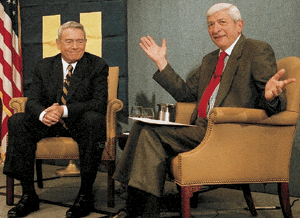 |
|
Dan Rather and Marvin Kalb enjoy a humorous moment during the Oct. 9 edition of “The Kalb Report” at The National Press Club.
|
Rather admitted that America—and its journalists—were “asleep, and sucker-punched” on Sept. 11. Actions in the form of prior terrorist attacks (hijacking of TWA 847, bombings of American embassies and military barracks, and even the earlier bombing of the World Trade Center itself) in retrospect were obvious warnings but were ignored, he said. Making clear that he included himself among those who were not sufficiently alert to the danger, he characterized much of today’s news philosophy as “dumb it down, sleaze it up.”
The CBS TV Evening News anchor/ managing editor responded positively to questions about journalistic patriotism, drawing a line between the public’s right to know and the endangerment of U.S. troops. In that vein he spoke movingly about his recollection of Dec. 7, 1941, when the reaction at his Houston home to Pearl Harbor was that many of his relatives immediately went downtown to enlist in the service. He saw lines around many blocks that Sunday as men queued up to join up.
The question of budget—especially the vying for resources that currently exists between news and entertainment divisions in broadcasting—drew an especially animated response from Rather. Asked about “budget constraints,” he said that these acted as “a boa constrictor on your news judgement.” Editorial decisions are always, he asserted, based upon financial concerns.
But not solely for reasons of greed, Rather made clear. Fear, he declared, has the ultimate power over all. The ratings and their potential effect on the future career of every broadcaster govern decision making.
“Dumb it down” and “Sleaze it up”? How about “Hang it up,” Kalb asked Rather. “You’re almost 70 years old. Any thoughts about retirement?” Rather barely hesitated. “No,” he replied, emphatically, to thunderous applause from an audience who had heard straight answers from a journalist whose courage is equal to his star-power.
—SH
Students Win NASA Design Competition
Winning first prize in NASA’s 2001 MarsPort Engineering Design Competition was a proud moment for students at GW’s Joint Institute for the Advancement of Flight Sciences in Hampton, Va. Their conception involved storage facility designs that will be essential to future manned Mars missions.
Four graduate students, Alicia Dwyer, Paul Escalera, Jill Hanna, and Corey Hernandez, and two faculty advisers, Robert Tolson and Paul Cooper, won the top accolades for devising blueprints for the MarsPort Cryogenics and Consumables Station, an integral storage element for the intricate infrastructure needed to propel spacecraft from the Martian surface. The MCCS generates and contains water, oxygen, and methane on the Mars surface, virtually abolishing the need for astronauts to transport those elements from earth. Astronauts consume the water and air, and the oxygen and methane is used as launch propellants once the assignment is finished.
The GW students’ device, composed of an oxygen producing mechanism, aluminum alloy storage cylinders, and a spacecraft launching pad, finished ahead of other space-oriented apparatuses designed by students from Cornell University, Embry Riddle Aeronautical University, Georgia Institute of Technology, the University of Tennessee, and the University of Wisconsin. The GW team spent nine months blueprinting the MCCS, and the group reaped its rewards during a May symposium at the Kennedy Space Center.
“I was most proud of the professionalism of the GW students,” faculty adviser Tolson says. “Our students have been involved in real-life missions before, and they take these things seriously. That was a major distinction between GW’s project and the other presentations.”
—ZK
Student Living Reaches New Heights
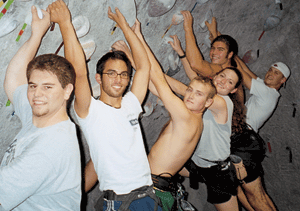 This fall, two GW professors ventured into an environment of loud music and late nights, a domain usually reserved for 18-year-olds: the freshman dorm. Robert McRuer, assistant professor of English, and Christopher Kayes, assistant professor of human and organization studies, are the newest faculty members to reside in on-campus housing for freshman students as part of the GW’s Faculty-in-Residence program. This fall, two GW professors ventured into an environment of loud music and late nights, a domain usually reserved for 18-year-olds: the freshman dorm. Robert McRuer, assistant professor of English, and Christopher Kayes, assistant professor of human and organization studies, are the newest faculty members to reside in on-campus housing for freshman students as part of the GW’s Faculty-in-Residence program.
Now in its fourth year, the Faculty-in-Residence program provides an opportunity for students and professors to interact outside the classroom, to create a scholarly and supportive environment for students in their own living space. In exchange for a furnished apartment and a $300 stipend, the professors perform various duties, such as hosting monthly dinners, providing regularly scheduled “open door evenings,” and holding semester-long discussion series on topics such as film or literature.
This semester, in particular, the program proved its value as a support system during the events of Sept. 11. McRuer, who resides in Lafayette Hall, returned from class that day to find the students in a state of fear and uncertainty. He was able to provide the comfort and guidance that many of the freshmen were anxiously seeking. “As a faculty resident, I treat my students with respect and try to help them work through problems as an equal. On Sept. 11, the students and I collectively made meaning of the tragic events.”
In the weeks following the attacks, McRuer used his position as a faculty resident to create a forum for students to voice their thoughts on the many facets of the tragedy. He held “rap sessions” with students, during which they discussed the attacks and the possibility of war. “I believe an important part of my role is to create an environment in which we can address contemporary events and work through problems together.”
While the program was created with students in mind, there are many benefits for the professors as well. Kayes, who resides in Thurston Hall, has discovered things about the students that he wouldn’t have seen in a classroom setting. “I’ve learned so much and had so much fun. The program has been a great opportunity to really get to know what college students are thinking today. I’ve learned how resilient today’s students are and how experiences in college shape your views for years to come.”
Faculty-in-Residence isn’t the only program GW offers to sponsor learning outside of the classroom. The University’s “Living and Learning Communities” allow students with shared interests to live together in a residence hall, where they are encouraged to learn from each other.
In some communities students take classes together and earn academic credit, but most of the communities are co-curricular, which means they live together and participate in various activities but do not earn credit. The majority of the communities are designed for freshmen, although members can choose to continue into their sophomore year.
The interests of the communities range from culinary arts to international affairs. Members of Watergate 723, the first co-curricular community established two years ago, live on the seventh floor of the Hall on Virginia Avenue, formerly the Premier Hotel and lookout post of the Watergate burglars during the 1972 scandal. The community studies the impact of Watergate on American politics through guest speakers and special events. Other communities include Press Room, in which students interested in media take tours of national newspapers such as The Washington Post and experience the energy of a live TV broadcast, and the Outdoor Adventure community, which plans active excursions like rock climbing (shown above).
The University saw a dramatic increase in freshman communities for the 2001-02 academic year, from eight communities to 23. Rebecca Sawyer, director of freshmen services, believes strongly in the benefits of the program. “You’re living with students who have a common interest, so, while you may be from different backgrounds or different regions of the country, there’s immediately something to talk about and bond the students and the community together.”
Assistant Director Kirsten Freeman thinks the environments provided by the communities are helpful for students who are new to the area and to college life. “It allows them to connect to the campus and to Washington, D.C., faster than other students who are trying to find their way on their own.” She understands that when students come to GW, their learning experience shouldn’t begin and end at the classroom door.
—Allison Gaddess
So, Mr. President….How did you spend your summer vacation?
There’s no doubt that each of us has a unique definition of “fun.” The editors of GW Magazine, for example, might choose something less challenging than rafting…..and might pick a locale other than the shores of the Colorado River in Arizona…..and most certainly, wouldn’t voluntarily opt for the seven-plus mile hike necessary just to get the adventure underway. GW’s intrepid president, however, is made of stronger stuff than we, as these photos suggest.

From here...
|
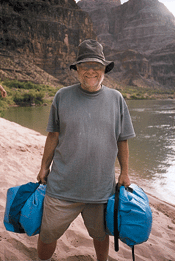
to here (7.5miles)
|
|

They'rrrre OFF!
|
|

“River’s a bit choppy today.”
|
|
|

“Okay—who took the raft?”
|
 |
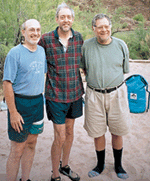
(from left): Eugene Tobin, President of Hamilton College, George Rupp, President of Columbia University, and Steve Trachtenberg, President of The George Washington University. (You don’t have to be crazy to be a university president, but it helps!)
|
|
At a Glance
GW Introduces New Institute
The “George Washington Institute of Public Policy,” formed to advance and coordinate public policy education and research among GW faculty, students, and the public, held a formal opening May 3 featuring a lecture by Urban League President Robert D. Reischauer. The institute (“GWIPP” for short) houses both master’s degree (MPP) and PhD programs in public policy. The Policy Research Program, a unit comprising faculty members and graduate students engaged in research on public policy problems, also is part of the institute. GWIPP Director Hal Wolman says, “The goal of GWIPP is to establish GW as one of the leading academic centers for public policy education and research in the United States. The Institute’s activities will serve to improve the processes and content of public decisions by connecting knowledge to the problems that confront out society.”
Kudos for Folkerts
The Freedom Forum has chosen Professor Jean Folkerts, interim dean of Columbian College of Arts and Sciences, as one of three recipients of the “Journalism Teacher of the Year” award. This award honors outstanding teaching and leadership in journalism’s core areas. Folkerts has been at GW since 1990 and served as director of the School of Media and Public Affairs until recently, when she was named to the interim deanship.
Rollberg Named Honors Program Director
Professor Peter Rollberg, a specialist in the fields of Russian literature and film history, is the new director of the University Honors Program. He succeeds David Alan Grier, who served as director since 1992 and who will return to teaching at GW following a year-long sabbatical. Rollberg has won two prestigious teaching awards at GW—the Bender Teaching Award in 1999, and the Oscar and Shoshana Trachtenberg Teaching Award in May 2001.
High Praise for Professor Grinker
R. Richard Grinker, professor of anthropology and international affairs, received one of two Honorable Mentions for the 2001 Turner Prize for Ethnographic Writing. The Turner prize competition is an annual, juried event. Grinker’s honored book, In the Arms of Africa, is a biography of late anthropologist and former GW faculty member Colin Turnbull. An article about the book, written by Grinker, was featured in the fall 2000 edition of GW Magazine.
GW Hosts Crossfire During Crisis Weeks
For two weeks after the terrorist attacks in New York and Washington, 1.6 million people each night tuned in to GW and CNN for the cable network’s nightly “Crossfire” program.
National unease mandated that CNN expand the show to a full hour in a town hall meeting format the first week; a parade of U.S. lawmakers, from Dick Gephardt to John McCain to Joseph Biden, tried to make sense of the chaos with hosts Bill Press and Tucker Carlson, as well as answering consistently insightful questions from GW students.
Artists Exhibit at Loudoun Campus
GW art students exhibit each year at the GW Art Show at the University’s Loudoun, Va., campus. This year’s show featured the work of fine arts graduate students in ceramics and painting. This is the third annual juried show, which is co-presented by the Loudoun Arts Council.
Geyer Joins GW as New Registrar
Dennis L. Geyer became the new University Registrar in June, succeeding Brian Selinsky following Selinsky’s recent move to the GW Information Systems and Services Department. Geyer comes to GW from the State University of New York at Stony Brook, and he earned both the BA and MA at Michigan State University.
One in a Million
Maybe not exactly, but very special nonetheless is Catherine Allen, one of 183 (of 2,700 applicants) 2001 Guggenheim Fellows. Allen, professor of anthropology and international affairs, will spend her fellowship writing a book patterning Andean cultural expression, based on her ethnographic research in Peru.
Correction
In the Summer 2001 issue of the magazine, the cover article on the opening of the new Media and Public Affairs Building should have included reference to the endowment, by Jack and Ann Morton, of the building’s 258-seat state-of–the-art auditorium, designed to attract media events. The magazine’s editors apologize for the omission.
GW in History
25 Years Ago
GW’s Title IX compliance becomes a fact, as the University announces funding for at least 34 women’s athletic scholarships totaling close to $90,000. The word comes at a press conference held by Women’s Athletic Director Lynn George March 2. This action makes GW the first area university to award athletic scholarships to women. GW administrators and coaches are working together in determining the number of scholarships and their amounts. GW’s eight women’s teams are badminton, basketball, crew, gymnastics, squash, swimming, tennis, and volleyball..
50 Years Ago
President Harry Truman (LLD ’46) sends a good luck message to students planning a career conference at the University. His message also articulates his beliefs about the danger of Russian aggression and the importance of good citizenship. “A well-informed, prosperous people will not be taken in by crackpot political theories,” he writes the students.
100 Years Ago
Minutes of the University Board of Trustees report an increase of 290 students over the past year’s enrollment. A total of 1,383 students are enrolled, divided among the following departments: Columbian College, 68; Scientific School, 322; School of Graduate Studies, 109; Law School, 491; School of Comparative Jurisprudence and Diplomacy, 82; Medical School, 246; Dental School, 65.
Readers wanting to learn more about GW’s history can find the University Archives Web site by accessing www.gwu.edu/~archives. The site’s Historical Almanac is especially informative.
|